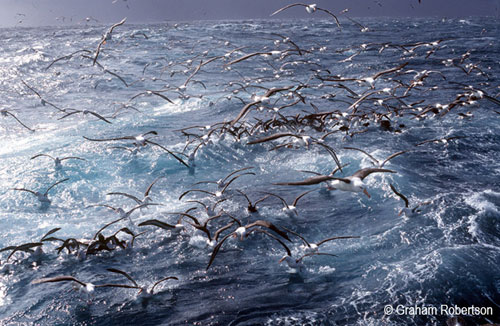
Black-browed Albatrosses gather behind a fishing vessel, photograph by Graham Robertson
Julien Collett and Henri Weimerskirch (Centre d'Etudes Biologiques de Chizé, Université de la Rochelle, Villiers-en-Bois, France) have published open access in the Proceedings of the Royal Society B Biological Sciences on the ability of Black-browed Albatrosses Thalassarche melanophris to memorize where they encountered vessels across consecutive foraging trips from Kerguelen.
The paper’s abstract follows:
“Human activities generate food attracting many animals worldwide, causing major conservation issues. The spatio-temporal predictability of anthropogenic resources could reduce search costs for animals and mediate their attractiveness. We investigated this through GPS tracking in breeding black-browed albatrosses attracted to fishing boats. We tested for answers to the following questions. (i) Can future boat locations be anticipated from cues available to birds? (ii) Are birds able to appropriately use these cues to increase encounters? (iii) How frequently do birds use these cues? Boats were spatially persistent: birds searching in the direction where they previously attended boats would encounter twice as many boats compared with following a random direction strategy. A large proportion of birds did not use this cue: across pairs of consecutive trips (n = 85), 51% of birds switched their foraging direction irrespective of previous boat encounters. Still, 15 birds (27%) were observed to closely approach (approx. 0.1–1 km) where they previously attended a boat while boats were no longer there. This is less than the distance expected by chance (approx. 10–100 km), based on permutation control procedures accounting for individual-specific spatial consistency, suggesting individuals could memorize where they encountered boats across consecutive trips. We conclude albatrosses were able to exploit predictive cues from recent boat encounters but most favoured alternative resources.”
Reference:
Collet, J. & Weimerskirch, H. 2020. Albatrosses can memorize locations of predictable fishing boats but favour natural foraging. Proceedings of the Royal Society B Biological Sciences 287. doi.org/10.1098/rspb.2020.0958.
John Cooper, ACAP Information Officer, 24 August 2020

 Français
Français  English
English  Español
Español